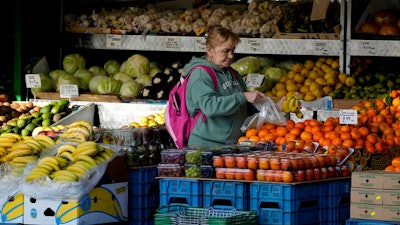
LONDON (AP) — Inflation in the U.K. fell to its lowest level in two and a half years in March after a further easing in food prices, official figures showed Wednesday, a development which could further pave the way for a welcome cut in interest rates soon.
Consumer prices rose by 3.2% in the year to March, down from 3.4% in February, the Office for National Statistics said. That's the lowest level since September 2021.
The fall in the annual rate was not as big as anticipated. Economists had predicted a reading of 3.1% for the month.
Inflation is still running higher than the Bank of England’s target of 2% but the direction of the move appears clear. Inflation hit a high above 11% at the end of 2022 in the wake of Russia’s invasion of Ukraine, which led to sharp increases in energy costs.
The fall means the U.K.'s inflation rate is lower than the U.S.'s for the first time in two years. In March, inflation in the U.S. rose to 3.5%.
Inflation is set to fall further in April, possibly to below 2%, as a result of sharply lower domestic energy bills, which economists think could prompt rate-setters at the Bank of England to consider a cut in interest rates in the next few months from the current 16-year high of 5.25%. However, a number of the nine policymakers have warned that the fight against inflation isn't over yet as they expect prices to start rising again in the second half of the year.
“With a further significant drop due next month, inflation should soon return to target and the pressure to cut interest rates will grow," said Simon Pittaway, senior economist at the Resolution Foundation think tank.
The Bank of England, like the U.S. Fed and other central banks around the world, raised interest rates aggressively in late 2021 from near zero to counter price rises first stoked by supply chain issues during the coronavirus pandemic and then by Russia’s invasion of Ukraine.
Higher interest rates — which cool the economy by making it more expensive to borrow, thereby bearing down on spending — have contributed to bringing down inflation worldwide.
Britain’s governing Conservative Party hopes that lower inflation and falling interest rates may trigger a feelgood factor ahead of a general election that has to take place by January 2025. Opinion polls show the main opposition Labour Party way ahead and headed for a big victory over the Conservatives, who have been in power since 2010.






















